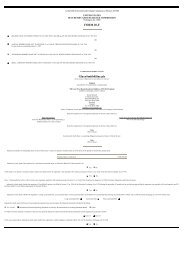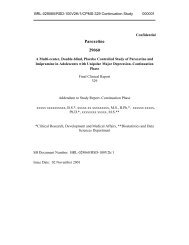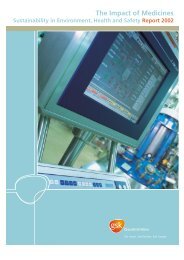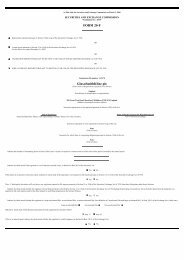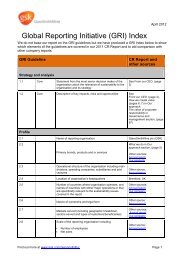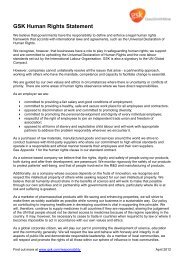GSK Annual Report 2002
GSK Annual Report 2002
GSK Annual Report 2002
Create successful ePaper yourself
Turn your PDF publications into a flip-book with our unique Google optimized e-Paper software.
2 Accounting policies<br />
Consolidation<br />
The consolidated Financial statements include:<br />
• the assets and liabilities, and the results and cash flow, of the<br />
company and its subsidiary undertakings, including Employee<br />
Share Ownership Trusts (ESOTs)<br />
• the Group’s share of the net assets and results of joint ventures<br />
and associated undertakings.<br />
The Financial statements of undertakings consolidated are made<br />
up to 31st December.<br />
Undertakings in which the Group has a material interest are<br />
accounted for as subsidiaries where the Group exercises dominant<br />
influence, as joint ventures where the Group exercises joint control<br />
and as associates where the Group can exercise significant<br />
influence. ESOTs are accounted for as subsidiaries on the grounds<br />
that the Group has de facto control.<br />
Interests acquired in undertakings are consolidated from the<br />
effective date of acquisition and interests sold are consolidated<br />
up to the date of disposal.<br />
Transactions and balances between subsidiary undertakings are<br />
eliminated; no profit is taken on sales between subsidiary<br />
undertakings or sales to joint ventures and associated undertakings<br />
until the products are sold to customers outside the Group.<br />
Goodwill arising on the acquisition of interests in subsidiary<br />
undertakings, joint ventures and associated undertakings,<br />
representing the excess of the purchase consideration over the<br />
Group’s share of the separable net assets acquired, is capitalised<br />
as a separate item in the case of subsidiary undertakings and as<br />
part of the cost of investment in the case of joint ventures and<br />
associated undertakings. Goodwill is denominated in the currency<br />
in which the acquisition is made and financed. In the case of<br />
acquisitions prior to 1998, goodwill was written off against<br />
reserves; on a subsequent disposal of assets from such acquisitions,<br />
any related goodwill is removed from consolidated reserves and<br />
charged to the consolidated profit and loss account.<br />
The Group’s interests in its joint ventures are accounted for using<br />
the gross equity method. The Group’s interests in its associated<br />
undertakings are accounted for using the equity method.<br />
Deferred taxation relief on unrealised intra-Group profit is<br />
accounted for only to the extent that it is considered recoverable.<br />
Assets and liabilities of overseas subsidiary and associated<br />
undertakings and joint ventures including related goodwill, are<br />
translated into sterling at rates of exchange ruling at the balance<br />
sheet date. The results and cash flows of overseas subsidiary and<br />
associated undertakings and joint ventures are translated into<br />
sterling using average rates of exchange. Exchange adjustments<br />
arising when the opening net assets and the profits for the year<br />
retained by overseas subsidiary and associated undertakings and<br />
joint ventures are translated into sterling, less exchange differences<br />
arising on related foreign currency borrowings, are taken directly<br />
to reserves and reported in the statement of total recognised<br />
gains and losses.<br />
In translating into sterling, assets, liabilities, results and cash flows<br />
of overseas subsidiary and associated undertakings and joint ventures<br />
reported in currencies of hyper-inflationary economies, adjustments<br />
are made to reflect current price levels. Any loss on net monetary<br />
assets is charged to the consolidated profit and loss account.<br />
Notes to the financial statements GlaxoSmithKline 83<br />
Foreign currency transactions<br />
Foreign currency transactions by Group companies are booked<br />
in local currency at the exchange rate ruling on the date of<br />
transaction, or at the forward rate if hedged by a forward<br />
exchange contract. Foreign currency assets and liabilities are<br />
translated into local currency at rates of exchange ruling at the<br />
balance sheet date, or at the forward rate. Exchange differences<br />
are included in trading profit.<br />
Revenue<br />
Revenue is recognised in the profit and loss account when goods<br />
or services are supplied to external customers against orders<br />
received. Turnover represents the net invoice value, after the<br />
deduction of discounts given at the point of sale, of products<br />
despatched to, or available for collection by, customers, less<br />
accruals for estimated future rebates and returns. Value added tax<br />
and other sales taxes are excluded from revenue.<br />
Expenditure<br />
Expenditure is recognised in respect of goods and services received<br />
when supplied in accordance with contractual terms. Provision is<br />
made when an obligation exists for a future liability in respect of a<br />
past event and where the amount of the obligation can be reliably<br />
estimated. Advertising expenditure is charged to the profit and loss<br />
account as incurred. Shipment costs on inter-company transfers are<br />
charged to cost of sales; distribution costs on sales to customers are<br />
included in selling, general and administrative expenditure.<br />
Restructuring costs are recognised in respect of the direct<br />
expenditures of a business reorganisation where the plans are<br />
sufficiently detailed and well advanced, and where appropriate<br />
communication to those affected has been undertaken at the<br />
balance sheet date.<br />
Research and development<br />
Research and development expenditure is charged to the profit<br />
and loss account in the period in which it is incurred. Tangible<br />
fixed assets used for research and development are depreciated in<br />
accordance with the Group’s policy.<br />
Environmental expenditure<br />
Environmental expenditure related to existing conditions resulting<br />
from past or current operations and from which no current or<br />
future benefit is discernible is charged to the profit and loss<br />
account. The Group determines its liability on a site-by-site basis<br />
and records a liability at the time when it is probable and can be<br />
reasonably estimated. This liability includes the Group’s own portion<br />
of the costs and also a portion of other potentially responsible<br />
parties’ costs when it is probable that they will not be able to satisfy<br />
their respective shares of the clean-up obligation. When recoveries<br />
of reimbursements are virtually certain they are recorded as assets.<br />
Legal and other disputes<br />
Provision is made for the anticipated settlement costs and legal and<br />
other expenses associated with claims received and legal and other<br />
disputes against the Group where a reasonable estimate can be<br />
made of the likely outcome of the dispute. No provision is made for<br />
unasserted claims or where an obligation exists under a dispute but<br />
it is not possible to make a reasonable estimate. Costs associated<br />
with claims made by the Group against third parties are charged to<br />
the profit and loss account as they are incurred.







